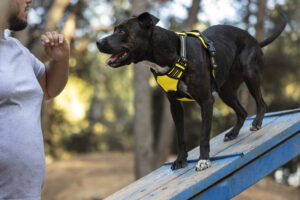Today, we’re debunking some common dog training myths that have been passed down through the ages. As much as we adore our canine companions, there are plenty of misguided notions out there that could lead us astray when it comes to teaching our dogs how to live in our world. So, let’s get into it!
Myth 1: You Can’t Teach an Old Dog New Tricks
Ah, the classic adage that implies our dogs lose their capacity to learn as they age. Well, dear reader, this couldn’t be further from the truth! While it’s true that puppies are like sponges, soaking up new knowledge, older dogs have the potential to learn just as well. The key here is patience, repetition, and an abundance of positive reinforcement. What gets rewarded, is repeated.
Remember, learning never stops, whether they’re a puppy or a distinguished senior. So, if you’re dealing with an older canine, don’t hesitate to introduce new tricks, activities, or behaviours. Teach your dog in a way they understand and give them an excellent reason to offer a behaviour and they will happily oblige.

Myth 2: Using Punishments Helps Speed up Training
In the world of dog training, positive reinforcement is the crown jewel. Some old-school trainers may advocate using punishments to establish discipline, but this can have detrimental effects on your puppy or dog’s mental well-being and trust in you. Professional dog trainers have long embraced the power of positive reinforcement, showering various types of reward when our four-legged pals exhibit good behaviour.
Dogs are social animals who love to learn, and using fear-based training techniques can lead to anxiety and distrust. So, instead of barking up the wrong tree, opt for a combination of food rewards, activities, play or affection to create a strong bond and encourage desirable behaviour.
Myth 3: Rubbing Their Nose in Mess Helps with Potty Training
Ah, the infamous potty training myth! Let’s set the record straight: rubbing your dog’s nose in their mess is not only ineffective but also downright abusive. It may sound like a quick fix, but it doesn’t teach them anything meaningful. Dogs live in the present moment, and by the time you’re scolding them, they’ve already forgotten what they did.
Proper potty training involves establishing a routine, using positive reinforcement when they do their business outside, and being understanding when accidents happen. Consistency and patience are the keys to success here, not punishment.
Myth 4: Only Professional Trainers Can Train Dogs Effectively
While professional dog trainers have their expertise, this myth suggests that average dog owners can’t successfully train their dogs without outside help. Au contraire! With a little dedication, anyone can train their furry companion. Training is a bonding experience that strengthens the relationship between you and your dog, so why leave it entirely to someone else?
It’s essential to educate yourself on positive training methods and to be consistent in your approach when teaching your
canine life skills. When addressing specific behavioural issues however, will most likely need to engage the services of a qualified behaviourist.
Myth 5: Dogs Understand English (or Any Human Language)
Ah, wouldn’t it be convenient if our pups understood every word we said? Unfortunately, dogs aren’t multilingual, and while they can learn certain words through association, and consequence they don’t comprehend language like humans do. So, when you’re telling your dog about your day, they might just tilt their head in adorable confusion.
However, dogs are excellent at reading body language and picking up on our emotions. They respond well to tone and inflection, so it’s not just what you say, but how you say it that matters. Keep those cues clear, consistent, and accompanied by some hand signals to maximize understanding.

Congratulations! You’ve just debunked some of the most prevalent dog training myths that have been pawing at your mind. Remember, training your canine companion is an ongoing journey that requires love, patience, and a sense of humour. Positive reinforcement and consistency are your best friends along the way.
So, let’s embrace science-backed training methods, have fun with our dogs, and create a harmonious environment where man’s best friend can thrive.
Now, Venture into reward based training and watch your relationship with your dog bloom!
